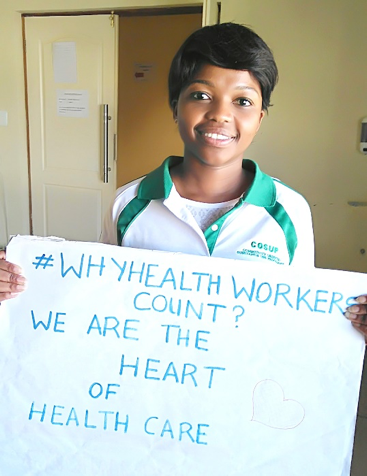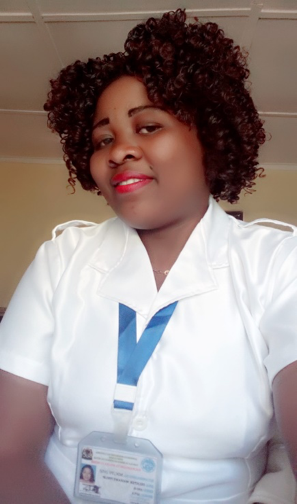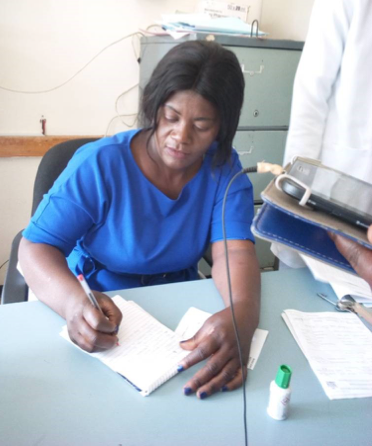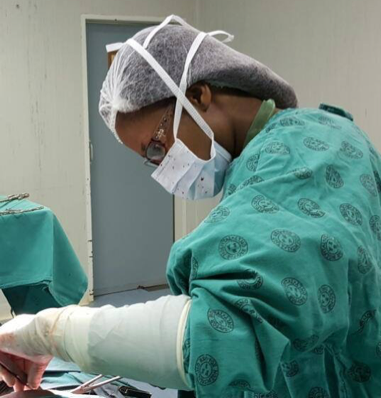Women on the Frontlines of Health Service Delivery
By Kathryn Utan, American International Health Alliance
Women make up 70% of the health workforce globally – particularly in the areas of nursing, midwifery, and community health work – according to the World Health Organization (WHO).
In low- and middle-income countries, these cadres are often the only trained health workers accessible to the vast majority of people, especially those living in rural or underserved areas.
Through our work developing sustainable mechanisms for countries to train human resources for health, the American International Health Alliance (AIHA) has been collaborating with local governments and stakeholders to educate, deploy, and support frontline health workers in sub-Saharan Africa since late 2004 through our HIV/AIDS Twinning Center Program. The Twinning Center supports the U.S. President’s Emergency Plan for AIDS Relief (PEPFAR) and is funded by the U.S. Department of Health and Human Services, Health Resources and Services Administration (HRSA).
AIHA recently asked some of the frontline health workers trained through our projects to tell us about their work. In honor of World Health Worker Week 2018, we’re pleased to shine a spotlight on these women and the critical health services they provide to their communities.
Dimakatso S. Nonyane, Clinical Associate
University of Pretoria, Department of Family Medicine
Pretoria, South Africa

Dimakatso S. Nonyane. Courtesy AIHA/South Africa.
Dimakatso S. Nonyane, 30, has been working as a clinical associate for six years. Similar to physician assistants in the United States, clinical associates are a university-trained medical cadre launched by the South Africa government in 2008 as a way to address the country’s severe gap in trained health workers.
Dimakatso has been working at the University of Pretoria for about two years and is currently a provider in the Department of Family Medicine’s Community Oriented Substance Use Porgram (COSUP). COSUP aims to help people, families, and communities understand and manage substance use and related risks, including contracting HIV.
“On an average day, I see 15-20 patients for medical and psychosocial intervention. As a clinical associate, my main function is providing primary healthcare services, which includes health promotion and education,” Dimakatso says, noting that the COSUP team plays a crucial role in reducing the health risks of people who use drugs.
“We also do a lot of community engagement to raise awareness and reduce stigma towards people who use drugs because it really hinders optimal reintegration within those communities,” she continues.
Explaining that she feels lucky to be a woman on the frontlines of health service delivery in South Africa, Dimakatso says, “My country has taken huge leaps forward in terms of woman empowerment and the Department of Family Medicine allows a lot of room for professorial growth and innovation.”
“I love what I do,” she admits. “Working within the substance use community has led to so much enlightenment and personal growth. Having the privilege to be part of someone’s journey of self-improvement and seeing that they have the will to be better and do better, my clients constantly inspire me as they commit to their own objectives.”
Felister Philipo, RN
Mwika Health Center
Moshi, Kilimanjaro Region, Tanzania

Felister Philipo. Courtesy AIHA/Tanzania.
Felister Philipo, 26, graduated from the Nursing Diploma Program at Machame School of Nursing and Midwifery in 2013 and soon began working as a registered nurse at the Arusha Lutheran Medical Center. The following year, she joined Mwika Health Center, where she is currently the Nurse in Charge.
“At Mwika, I support and supervise nurses as they provide care to patients, including reproductive, maternal, and child health services, as well as HIV/AIDS treatment,” Felister says, noting that she also task shares as a pharmacist at the facility.
Mwika Health Center has two HIV Care and Treatment Clinics – one for adults and another for pediatric patients.
“The adult clinic runs every Thursday and I serve between 60 to 80 patients each time,” she explains. “We hold the pediatric clinic on the last Saturday of every month and I currently have 38 pediatric and adolescent clients on antiretroviral therapy (ART).”
Thanks to Tanzania’s new task sharing policy that has empowered nurses and other frontline health workers, Felister provides health education, ART refills, counseling, and psycho-social support to her patients. She also monitors her ART clients through viral load testing to effectively manage their treatment. “When data shows high viral load, I provide enhanced adherence counseling; in cases when the patient is properly adherent, I prescribe second-line medications,” she says.
“Being a woman on the frontlines of health service delivery in Tanzania is personal for me. I make sure I personally follow up with my pediatric and adolescent clients who miss appointments and, when lost to follow-up care, I visit their homes to find them and get back on treatment,” Felister reports. “It is a wonderful thing to serve people, especially when you know you have done your best and your clients are satisfied. I take this responsibility very seriously. I serve my clients exactly the same way I would wish to be served.”
Ruth Kafunti Chawaya, Clerk and Peer Educator
Maina Soko Military Hospital, Lusaka, Zambia

Ruth Kafunti Chawaya. Courtesy AIHA/Zambia.
Ruth Kafunti Chawaya, 43, has worked as a clerk at Maina Soko Military Hospital in Lusaka for 22 years. She is also a peer educator who works closely with patients to arm them with the knowledge they need to stay healthy or to manage chronic conditions.
“We see more than 40 patients on any given day,” Ruth says. “People come to the hospital for various reasons, whether it’s screening for cervical cancer, HIV testing and counseling, surgical care, or other medical problems.”
They also come to the hospital for referrals to various clinics that specialize in TB, HIV, or diabetes care, she points out.
“It’s a good calling, but it’s also challenging – especially when you have to convince people who are sick to take charge of their health and live a positive life,” Ruth admits.
“Being a woman on the frontline of health service delivery in Zambia makes me proud. I know that being sick is not easy … I am often the first person to greet people in need as they enter the facility. It’s very satisfying to be able to help them,” she says. “Through my work, I am helping to reduce stigma and discrimination against people living with HIV. It makes me proud to deliver this service to my community.”
Nqobile Ngoma, Clinical Associate
Mmametlhake District Hospital,
Mpumalanga Province, South Africa

Ngobile Ngoma. Courtesy AIHA/South Africa.
Clinical Associate Ngobile Ngoma, 28, has been working in the Obstetrics Department of Mmametlhake District Hospital since 2015.
She routinely sees about 20 patients a day, providing prenatal, antenatal, and postnatal care, doing ultrasounds, assisting in the labor ward, attending to obstetrics emergencies, assisting with C-sections, and administering and maintaining anesthesia.
Although there are challenges as a member of one of South Africa’s newest medical professions, Ngobile says she is proud that she has successfully acquired much of the knowledge and skills that enable here to render quality health service to her community.
“To be a woman on the frontlines of health service delivery in South Africa is a great privilege and honor, she says. “I’m thankful to serve God and fulfill my purpose through my work,” she says.
